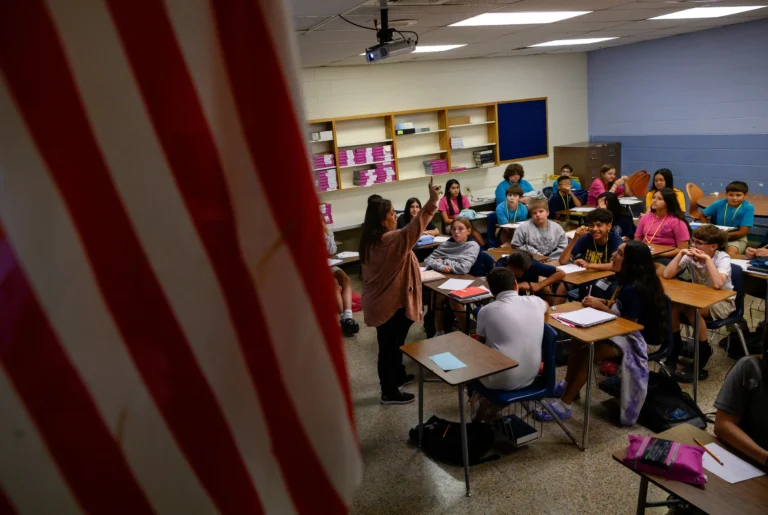The Texas Home offered initial authorization Monday to an expense that would certainly get rid of STAAR, the high-stakes standard examination that the state and institution areas utilize to keep an eye on pupil understanding and instructor efficiency.
The STAAR examination “results in anxiousness in our class with our educators, and it results in definitely no info that a moms and dad can recognize,” stated Rep. Brad Buckley, R-Salado. “Evaluation must be instructionally pertinent and workable.”
House Expense 4 obtained a close to consentaneous enact your house on Monday, however deals with a difficult roadway in the Us senate. The top chamber has its very own concept of what an overhaul of the state standard examination and the liability system ought to appear like. The gulf in between the propositions is vast– one legislators will certainly require to enclose the last weeks of this year’s legal session.
Both your house and Us senate variations of the regulation would certainly exchange the State of Texas Analyses of Academic Preparedness, or STAAR, with a much shorter examination to maximize time for even more direction. Pupils would certainly be examined at the start, center and end of the academic year so educators can utilize examination outcomes to determine locations for renovation and form their lesson strategies. The propositions would certainly likewise alter the state liability system that qualities areas on an A-F range.
Both chambers had almost similar variations of regulation at the beginning of session. The Us senate passed its proposition last month. Your home, at the same time, entirely reworded its proposition after public testament and closed-door conferences where institution leaders hammered on their absence of rely on the state’s liability and screening systems.
” It is time to reconstruct rely on our system, and HB 4 does simply that. It is time for analyses to notify direction in an actual time fashion,” Buckley stated. “We require to make screening simply one more day at institution.”
The Home proposition, however not the Us senate’s, would certainly alter exactly how pupils are rated. As opposed to utilizing a stiff range to track pupils’ scholastic efficiency, their results would certainly be contrasted to their peers around the nation. Advocates of your house proposition state that method would certainly be a much better measuring stick. Movie critics state the adjustment would certainly cover whether Texas pupils have actually fulfilled assumptions for grade-level abilities.
The STAAR examination has actually long been slammed for being also strenuous to precisely show grade-level requirements. Numerous instructors likewise state preparing pupils for the examination uses up way too much class time without enhancing direction.
” Exactly how Texas manages institution liability presently does not function. Our children are over-tested and our educators are worn,” Nikki Cowart, the head of state of the Cy-Fair institution area’s phase of American Federation of Educators, affirmed before legislators last month. “Our institution areas have actually been penalized for falling short to fulfill undependable and approximate requirements with mistreated and undependable screening information.”
The 2 chambers have actually recommended various timelines for applying the regulation. Your home desires pupils to take the brand-new examination as very early as this autumn, while the Us senate offers the Texas Education and learning Firm till 2028 to construct out a brand-new analysis. Your home likewise moves some oversight of the statewide analysis to the State Board of Education And Learning, while the Us senate maintains that oversight under the TEA.
Pupils’ STAAR efficiency is a vital statistics in the state’s scores of institution areas and institution universities, which are rated on an A-F range every year. Poor scores can bring about state assents, which in one of the most extreme situations can indicate a state requisition.
HB 4 would certainly likewise restrict when the TEA can make adjustments to the means areas’ A-F scores are determined. It follows institution efficiency scores were stood up in court for 2 successive years. Areas had actually taken legal action against the state due to the fact that they stated the TEA was also rash in presenting adjustments that impacted their ranking, offering an unreliable image of their efficiency.
Your home costs would certainly call for the TEA commissioner to obtain authorization from the Legislature for all significant adjustments to the scores system. It would certainly likewise establish a due date for the firm to wrap up requirements for A-F scores so institution leaders have adequate time to plan for any type of adjustments.
Areas can still file a claim against to test adjustments to the liability system– however the costs establishes a fast-track court procedure for those suits to be resolved so conflicts do not impact the launch of the scores.
On the other hand, the Us senate costs would certainly make it hard for areas to utilize the courts. Us senate Expense 1962 would certainly enforce constraints on exactly how institution areas pay their lawyers’ costs for matches connected to their efficiency scores. Those that file a claim against would certainly unlock to boosted TEA oversight.
This short article initially showed up in The Texas Tribune, a member-supported, detached newsroom educating and involving Texans on state national politics and plan.



